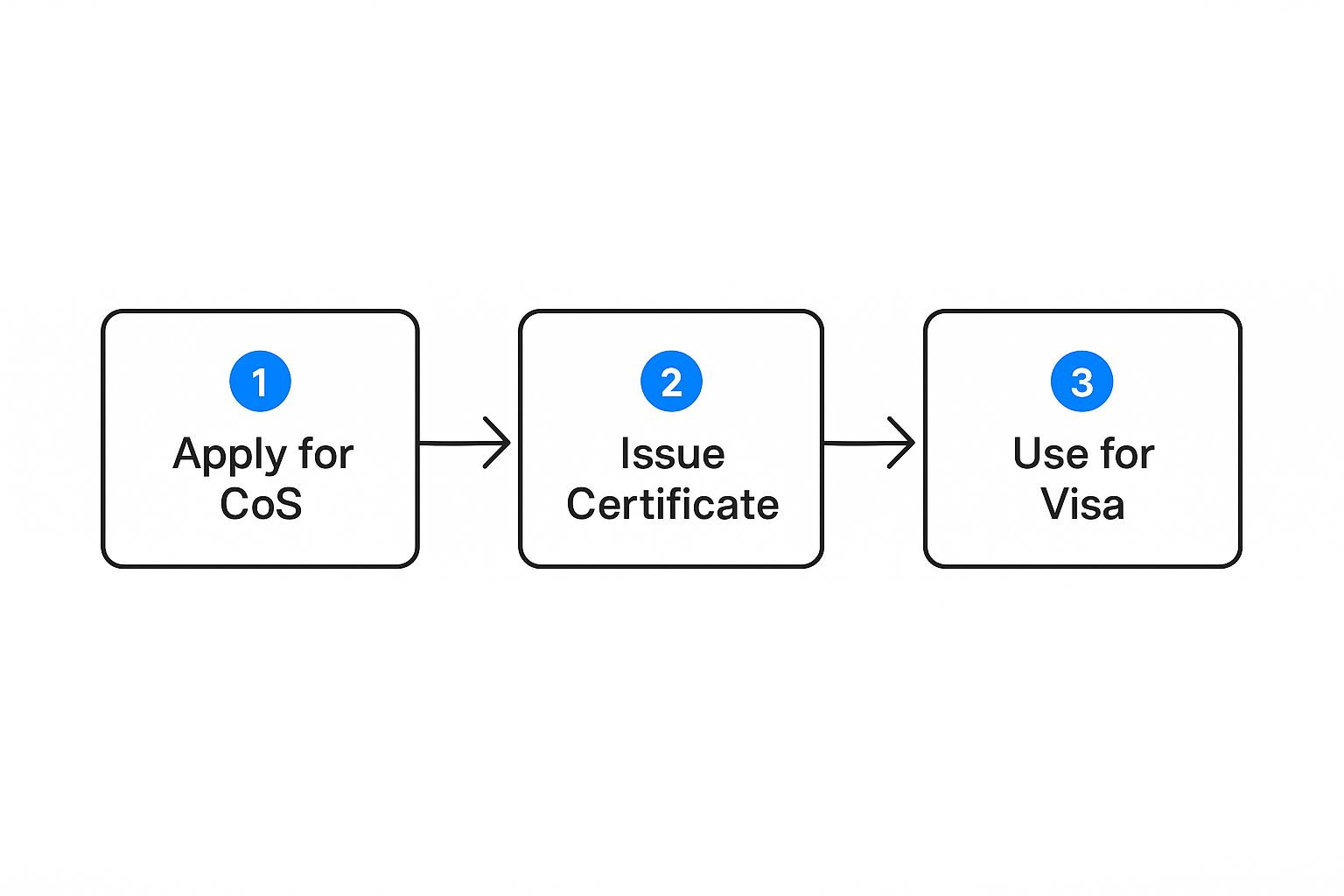Certificate of Sponsorship: Your Complete UK Work Visa Guide

What Makes a Certificate of Sponsorship Essential

Think of a Certificate of Sponsorship (CoS) as your golden ticket to working in the UK. It’s not just a piece of paper, but a unique electronic record that represents a solid agreement between your future employer and the UK Home Office. This digital confirmation is the employer’s way of saying, "We need this person's skills, and we vouch for them." Without this crucial endorsement, your application for a Skilled Worker visa simply cannot move forward.
This system is more than just bureaucracy; it's a structured way for the UK to manage its workforce needs while controlling immigration. It makes sure that only legitimate employers with a real need for international talent can hire from overseas. By using an electronic system instead of old paper certificates, the government can track every detail of your job offer, ensuring everything is properly logged and verified. This gives them a clear picture of who is coming to work in the UK and for what reason.
The Power of an Official Endorsement
Your CoS is powerful because it officially validates your job offer to immigration authorities. It comes with a unique reference number that you must put in your visa application. This number directly connects your application to your employer's approved sponsorship, making the whole process transparent.
For a UK company to give you a Certificate of Sponsorship, it must first be approved by the Home Office and be on the official register of licensed sponsors. This is a non-negotiable step for any business wanting to hire foreign workers who don't already have the right to work in the UK. This register includes companies from many industries, especially those with high demand like healthcare, IT, and engineering. This shows how the CoS system helps fill important skills gaps in the UK economy. You can learn more about the official requirements for UK visa sponsorship on the government's website. Understanding this process will give you a major advantage in your journey.
Finding The Right Licensed Sponsor For Your Career
Not just any company in the United Kingdom can offer you a job that qualifies you for a work visa. To issue a Certificate of Sponsorship (CoS), a business must first be approved and vetted by the UK Home Office. This means your job search needs to be strategic, focusing only on these licensed sponsors.
Think of it this way: if you needed a critical repair on your car, you wouldn't go to just any mechanic. You'd look for one who is certified and has the official credentials to do the job properly. Similarly, you must target employers with the official licence to sponsor international workers. The UK government provides a public register of licensed sponsors which is the most important tool for your search.
Identifying Genuine Sponsorship Opportunities
Your first move should always be to check any potential employer against this official register. If a company promises you sponsorship but isn't on the list, consider it a major red flag. Legitimate sponsors are well aware of their duties and the costs involved.
For example, following recent rule changes, employers are legally not allowed to ask you, the worker, to pay for costs like the £239 Certificate of Sponsorship issuance fee or the Immigration Skills Charge. A company asking you to cover these expenses is not just breaking the rules; they are putting their own sponsor licence at risk.
Understanding Sponsor Licence Categories
It's also important to know that sponsors hold different types of licences. The 'Skilled Worker' licence is the most common and covers the majority of professional jobs. However, there are other categories like 'Global Business Mobility' or 'Temporary Worker', each designed for specific kinds of employment.
To help clarify this, the table below breaks down the main types of UK sponsor licences and what they mean for your job search.
| Licence Type | Visa Categories Supported | Typical Industries | Key Requirements |
|---|---|---|---|
| Skilled Worker | Skilled Worker visa | Tech, Healthcare, Engineering, Finance, Education | The job must meet specific skill and salary levels. The employer must prove there's a genuine vacancy. |
| Global Business Mobility | Senior or Specialist Worker, Graduate Trainee, UK Expansion Worker | Multinational corporations, companies expanding to the UK | Primarily for transferring existing employees from an overseas branch to the UK. |
| Temporary Worker | Creative Worker, Charity Worker, Religious Worker, Seasonal Worker | Arts, Non-profit, Religious organisations, Agriculture | For short-term, specific roles. Not a direct route to settlement. |
| Scale-up | Scale-up visa | High-growth tech and science companies | For fast-growing businesses ('scale-ups') that meet specific growth criteria. Offers more flexibility for the worker. |
Understanding which licence an employer holds is crucial. It tells you if they can actually sponsor you for the specific role you're interested in. This knowledge saves you from wasting time applying for jobs at companies that can't support your visa application, making your search much more effective.
Navigating The Certificate Of Sponsorship Process Successfully
Securing a job offer is a massive achievement, but the real journey to the UK begins when your employer starts the Certificate of Sponsorship (CoS) process. Think of this stage as a partnership between you and your new boss. Understanding what happens behind the scenes is key to a smooth outcome because you have an active role to play.
This simple flowchart shows the three main stages your sponsorship journey will take.

As you can see, the process flows from your employer's application to your final visa submission, with the certificate acting as the crucial bridge between them.
The Employer's Role: Behind The Scenes
Once you've accepted the job offer, your employer gets to work. They will apply for a CoS using their Sponsor Management System (SMS) account, which is a secure online portal provided by the UK Home Office. They need to enter specific details about you, the role, your salary, and prove that the job meets the required skill level. This is often where delays can pop up, especially if the employer is slow to act or needs more documents from you.
The screenshot below, taken from the official gov.uk website, explains what a CoS is and what it does.

This official guidance makes it clear that the CoS is an electronic record, not a physical paper. It contains a unique reference number that is essential for your visa application.
Your Role: Proactive Preparation
While your employer is busy on the SMS portal, your responsibility is to get all your documents ready. Be prepared to provide things like your passport, educational certificates, and proof of your English language ability as quickly as possible. Any hold-up on your end can create a bottleneck for the entire process.
It is also wise to have a clear conversation about the costs. For example, the CoS issuance fee is £239, a cost your employer is legally required to cover. Knowing who pays for what, including the main visa fee, prevents confusion later on. Once you have your CoS number, you can proceed with confidence. Being prepared and keeping the lines of communication open with your employer will greatly improve your chances of success.
Why Nigerian Professionals Dominate UK Certificate of Sponsorship Success

Nigerian professionals have built a strong reputation in the United Kingdom, making them highly desirable candidates for employers who offer a Certificate of Sponsorship. This isn't just by chance; it's the product of a potent mix of quality education, resilience, and a professional drive that UK companies greatly appreciate.
The Nigerian Advantage in the UK Market
Many professionals from Nigeria come to the UK with degrees from well-regarded universities and important experience in competitive industries. This academic and professional foundation frequently matches the needs of the UK's skills gap, especially in fields with high demand. Industries such as healthcare, technology, and engineering often look to Nigeria to find skilled individuals who can contribute right away. This reputation for excellence provides Nigerian candidates with a clear advantage when they apply for sponsored positions.
Additionally, the long-standing historical and cultural connections between Nigeria and the UK help create a smoother transition. A shared official language and similar approaches to business mean that Nigerian professionals can adapt to the UK work environment with ease, which is a big plus for employers. You might want to learn about the new UK immigration white paper and what every Nigerian should know, as it offers more insight into these changing policies.
Acknowledged Contribution to the UK Workforce
While the UK government does not usually release data connecting a Certificate of Sponsorship directly to an applicant's nationality, the wider immigration statistics tell a compelling story. Nigerian nationals are consistently a major group receiving Skilled Worker visas. For example, in 2022, Nigerians accounted for a large number of work visa applications, driven by high demand in sectors like nursing and software development.
This pattern shows Nigeria's vital role in supplying the UK with skilled professionals, highlighting the success that Nigerian talent has achieved within the sponsorship system. To see the numbers for yourself, you can review the full UK immigration statistics data to understand these trends more deeply.
Reading The Market: Certificate Of Sponsorship Trends That Matter

Thinking about the UK job market is a bit like watching the tide at a Lagos beach; knowing when the tide is high helps you catch the biggest waves. In the same way, the availability of a Certificate of Sponsorship (CoS) isn't always the same. It changes with the UK's economic needs, new government policies, and even the time of year. Paying close attention to these patterns can make your job search much smarter.
The story of the CoS over the last few years shows a major recovery and a strong demand for skilled people. Recent data reveals a powerful increase in sponsorship as the UK worked to fill job shortages after the pandemic. This information gives you a clear edge, helping you see which industries are hiring the most and when you might face more competition.
Decoding the Data: Skilled vs. Temporary Work
The numbers clearly show where the demand is strongest. Between the second quarter of 2021 and the first quarter of 2023, visa applications that required a Certificate of Sponsorship more than doubled. They jumped from 30,643 to a high of 70,624. This increase was mostly driven by the Skilled Worker visa category, which saw an incredible rise from just under 15,000 to nearly 59,000 applications in the same timeframe. This tells us that UK employers have a big and growing need for long-term, skilled professionals.
On the other hand, Temporary Worker visas were much more unpredictable, which suggests that short-term jobs are not as consistent. The data highlights the UK's focus on bringing in and keeping skilled workers to help its economy grow.
To give you a clearer view, here's a look at how CoS issuance has changed over recent quarters. This table breaks down the statistics, showing the patterns in different visa categories.
| Quarter | Total CoS Applications | Skilled Worker Visas | Temporary Worker Visas | Extensions of Stay |
|---|---|---|---|---|
| Q2 2021 | 30,643 | 14,987 | 8,543 | 7,113 |
| Q3 2021 | 35,891 | 18,234 | 9,112 | 8,545 |
| Q4 2021 | 42,115 | 23,456 | 10,234 | 8,425 |
| Q1 2022 | 48,765 | 29,876 | 10,543 | 8,346 |
| Q2 2022 | 55,234 | 36,123 | 11,234 | 7,877 |
| Q3 2022 | 61,879 | 42,567 | 11,543 | 7,769 |
| Q4 2022 | 68,912 | 51,234 | 10,123 | 7,555 |
| Q1 2023 | 70,624 | 58,987 | 4,567 | 7,070 |
The data in the table confirms the powerful trend towards skilled roles. The sharp rise in Skilled Worker visas compared to the fluctuating numbers for temporary work shows where the real, stable opportunities are. You can look into the numbers yourself by checking the UK government's sponsorship datasets.
This focus on skilled professionals is fantastic news for Nigerians who have expertise in high-demand fields like tech, healthcare, and engineering. By timing your job search to match these trends, you present yourself as the solution to a clear market need, greatly improving your chances of getting that all-important Certificate of Sponsorship.
Avoiding The Traps That Derail Certificate Of Sponsorship Dreams
Securing a job offer is a massive step, but your journey to the UK can still hit a roadblock because of simple, preventable errors. Understanding these common pitfalls is key, as they can lead to expensive delays or even ruin your chances of getting a Certificate of Sponsorship.
Common Mistakes and Red Flags
Many mistakes boil down to poor communication or a lack of understanding from either the applicant or the employer. For instance, a frequent problem is incorrect documentation. If your employer submits your application with missing or inaccurate information, the UK Home Office will likely reject it, and you'll have to start the entire process again. Time is also a critical factor; a CoS has an expiry date, and if you fail to apply for your visa before it runs out, the certificate becomes worthless.
Another major warning sign is when an employer asks you to pay for certain fees. According to current UK regulations, it is illegal for an employer to charge you for:
- The Certificate of Sponsorship issuance fee
- The Immigration Skills Charge
- The sponsor licence application fee
An employer asking you to cover these costs is not just breaking the law; they are also putting their sponsor licence at risk. This is a clear signal that you might be dealing with a problematic or non-compliant company. To get a clear picture of what you should and shouldn't pay for, our detailed guide on the UK work visa cost breaks down the legitimate fees you are responsible for.
Knowing about these traps changes you from just a hopeful applicant into a well-prepared one. Always double-check an employer's licence and be cautious of any requests for payments that are not your responsibility.
Your Strategic Action Plan For Certificate Of Sponsorship Success
Now that you have a solid grasp of what a Certificate of Sponsorship is, it's time to put that knowledge into action. This section will guide you through building a practical strategy, offering clear, actionable steps to help you confidently pursue your UK career ambitions.
Targeted Job Search and Networking
A focused job search is crucial. Your first step should be to create a list of potential employers by going directly to the source: the official UK register of licensed sponsors. Instead of sending out countless generic CVs, carefully tailor each application. Emphasise the skills you have that are in high demand, particularly in sectors like healthcare or technology.
At the same time, become active on professional networking platforms. Connect with hiring managers and recruiters at the companies on your list. A polite, direct message explaining your interest in sponsored roles can often open doors that a standard application might not.
Demonstrating Your Value
In every interaction—from your cover letter to your final interview—your main objective is to prove you are a worthwhile investment for the employer. Be prepared to discuss your long-term career goals and explain exactly how your skills will contribute to their company's success. Have concrete examples from your past work ready to share.
It also helps to create a simple timeline for your visa application process to show potential employers. This demonstrates that you are organised, proactive, and understand the requirements for securing a certificate of sponsorship. This preparation makes you a much more appealing and less risky candidate in their eyes.
Ready to make your move with confidence? JapaChat is Nigeria’s first AI immigration expert, designed to give you instant, accurate answers for your relocation journey. Sign up for free at JapaChat and start planning your future today.

Leave a Reply